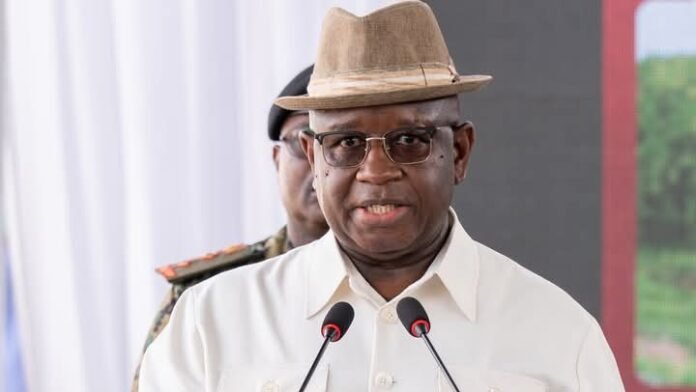BY Mahmud Tim Kargbo
In Sierra Leone, the presidency has become an untouchable political altar, a place where loyalty eclipses truth and constitutional duty is sacrificed on the pyre of personality politics. This malaise is not the preserve of one party. It flourished under Ernest Bai Koroma’s All People’s Congress (APC) and continues unabated under Julius Maada Bio’s Sierra Leone People’s Party (SLPP). More than two decades ago, the Truth and Reconciliation Commission (TRC) sounded the alarm about “a culture of personality politics, cynicism, and impunity” corroding the foundations of governance (TRC Report, Vol. 2, Chap. 3, para. 15: http://www.sierraleonetrc.org/index.php/view-report-text-vol2), yet the warning has been stubbornly ignored.
The problem is not uniquely Sierra Leonean. As political theorist James Burnham warned in Congress and the American Tradition (1959), democracies lose their vitality when legislatures surrender their authority to the executive, mistaking centralised power for efficient governance (http://www.amazon.com/dp/B0007DNZQG). His contemporary, Willmoore Kendall, argued that the “presidential majority”, national in scope, impatient with deliberation and prone to demagoguery, often tramples the “congressional majority”, which is better suited to represent a nation’s diverse interests. Recent American political crises, such as those documented in Jake Tapper and Alex Thompson’s Original Sin: President Biden’s Decline, Its Cover Up, and His Disastrous Decision to Run Again (http://www.penguinrandomhouse.com/books/708072/original-sin-by-jonathan-karl/), have shown that when loyalty to a leader overrides loyalty to institutions, truth and accountability are the first casualties. Sierra Leone’s Parliament today, much like the U.S. Congress described in these critiques, too often serves as an auxiliary to the presidency rather than an independent guardian of the public interest.
While the United States debates the fitness and longevity of President Joe Biden, a debate fuelled by Original Sin’s revelations, Sierra Leone confronts its own, less-publicised crisis: entrenched governance fatigue entwined with concealed economic mismanagement. Here, the trappings of high office are jealously guarded. Presidents and their inner circles cling to power with a vice-like grip, and dissent within ruling parties is met with reprisals, intimidation and the familiar charge of disloyalty.
The unconstitutional removal of Vice President Sam-Sumana in 2015 under Koroma, despite compelling legal arguments and the African Court on Human and Peoples’ Rights ruling in his favour (http://www.african-court.org/cpmt/details-case/001-2016), and the procurement scandals under Bio’s administration, documented in the 2022 Audit Service Report (http://www.auditservice.gov.sl/report/annual-audit-reports/), reveal a troubling continuity. In theory, Parliament serves as the people’s watchdog; in practice, it too often functions as little more than a rubber stamp for the Executive, in violation of Section 73(1) of the 1991 Constitution (http://www.parliament.gov.sl/dnn/Constitution).
The consequences of this presidential cult are tangible. Youth unemployment remains above 70% (Statistics Sierra Leone, 2023: http://www.statistics.sl/), while the nation languishes in the lowest quartile of the Human Development Index (UNDP, 2024: http://hdr.undp.org/). The TRC’s assertion that “political impunity at the top breeds political lawlessness at the bottom” (Vol. 2, Chapter. 3, paragraph. 32) is no longer a theoretical caution; it is the lived experience of millions of Sierra Leoneans.
If Sierra Leone is to reclaim its democratic promise, the culture of presidential supremacy must be confronted head-on. This requires more than rhetoric; it demands structural reforms that restore constitutional balance and strengthen civic accountability.
A Seven-Point Plan to Reclaim Sierra Leone’s Democracy
First, all Presidents and Members of Parliament should be subject to mandatory annual physical and mental health assessments, together with comprehensive asset declarations. These must be verified by an independent body and published promptly for public scrutiny, echoing debates on presidential fitness currently taking place in the United States.
Second, parliamentary committees, operating under Sections 119 and 122 of the Constitution, must be granted the full authority to scrutinise all major government projects and expenditure without obstruction from the Executive. This oversight should be both transparent and binding in its outcomes.
Third, the entrenched seniority systems in Parliament must be reformed. Term limits should be imposed on committee chairmanships, and all appointments should be made on the basis of merit rather than political patronage or age-based hierarchy.
Fourth, all recommendations arising from audit reports must be enforced. Parliament should hold open public hearings on every report, with clear and enforceable timelines for investigations and prosecutions where malpractice or mismanagement is discovered.
Fifth, the government should embark on a sustained programme of nationwide civic education. Citizens, particularly young people and civil society organisations, must be equipped with the constitutional literacy and practical tools necessary to demand accountability from their leaders.
Sixth, the presidential two-term limit must be regarded as inviolable. Political parties should be legally required to adopt transparent and democratic succession processes, ensuring no leader manipulates the system to extend their rule.
Finally, youth must be given a meaningful role in governance. This should include the creation of parliamentary youth caucuses with genuine policy influence, and every youth-focused government programme must be subject to independent audits to guarantee measurable and transparent results.
Elections must not be reduced to the hollow ritual of swapping faces while leaving broken systems intact. The cult of the presidency is a slow-acting poison, suffocating the constitutional ideals of 1991 and betraying the sacrifices made for freedom. The duty now falls on every Sierra Leonean, from the corridors of power to the most remote villages, to demand governance that serves the nation, not the ego of the leader. Only then can Sierra Leone breathe life back into its democracy.
Disclaimer:
The views expressed in this commentary are solely those of the author and do not in anyway reflect the opinions or editorial policy of Africa Publicity








